constituent assembly of india debates (proceedings)- volume vii
constituent assembly of india debates (proceedings)- volume vii
constituent assembly of india debates (proceedings)- volume vii
Create successful ePaper yourself
Turn your PDF publications into a flip-book with our unique Google optimized e-Paper software.
Government <strong>of</strong> India Act, 1935, I make no apologies. There is nothing to be ashamed <strong>of</strong> in borrowing. It<br />
involves no plagiarism. Nobody holds any patent rights in the fundamental ideas <strong>of</strong> a Constitution. What<br />
I am sorry about is that the provisions taken from the Government <strong>of</strong> India Act, 1935, relate mostly to<br />
the details <strong>of</strong> administration. I agree that administrative details should have no place in the Constitution.<br />
I wish very much that the Drafting Committee could see its way to avoid their inclusion in the<br />
Constitution. But this is to be said on the necessity which justifies their inclusion. Grote. the historian <strong>of</strong><br />
Greece, has said that:<br />
"The diffusion <strong>of</strong> constitutional morality, not merely among the majority <strong>of</strong> any community<br />
but throughout the whole, is the indispensable condition <strong>of</strong> a government at once free and<br />
peaceable; since even any powerful and obstinate minority may render the working <strong>of</strong> a<br />
free institution impracticable, without being strong enough to conquer ascendency for<br />
themselves."<br />
By constitutional morality Grote meant "a paramount reverence for the forms <strong>of</strong> the Constitution,<br />
enforcing obedience to authority acting under and within these forms yet combined with the habit <strong>of</strong><br />
open speech, <strong>of</strong> action subject only to definite legal control, and unrestrained censure <strong>of</strong> those very<br />
authorities as to all their public acts combined too with a perfect confidence in the bosom <strong>of</strong> every citizen<br />
amidst the bitterness <strong>of</strong> party contest that the forms <strong>of</strong> the Constitution will not be less sacred in the<br />
eyes <strong>of</strong> his opponents than in his own." (Hear, hear.)<br />
While everybody recognizes the necessity <strong>of</strong> the diffusion <strong>of</strong> Constitutional morality for the peaceful<br />
working <strong>of</strong> a democratic Constitution, there are two things interconnected with it which are not,<br />
unfortunately, generally recognized. One is that the form <strong>of</strong> administration has a close connection with<br />
the form <strong>of</strong> the Constitution. The form <strong>of</strong> the administration must be appropriate to and in the same<br />
sense as the form <strong>of</strong> the Constitution. The other is that it is perfectly possible to pervert the Constitution,<br />
without changing its form by merely changing the form <strong>of</strong> the administration and to make it inconsistent<br />
and opposed to the spirit <strong>of</strong> the Constitution. It follows that it is only where people are saturated with<br />
Constitutional morality such as the one described by Grote the historian that one can take the risk <strong>of</strong><br />
omitting from the Constitution details <strong>of</strong> administration and leaving it for the Legislature to prescribe<br />
them. The question is, can we presume such a diffusion <strong>of</strong> Constitutional morality? Constitutional<br />
morality is not a natural sentiment. It has to be cultivated. We must realize that our people have yet to<br />
learn it. Democracy in India is only a top-dressing on an Indian soil, which is essentially undemocratic.<br />
In these circumstances it is wiser not to trust the Legislature to prescribe forms <strong>of</strong> administration.<br />
This is the justification for incorporating them in the Constitution.<br />
Another criticism against the Draft Constitution is that no part <strong>of</strong> it represents the ancient polity <strong>of</strong><br />
India. It is said that the new Constitution should have been drafted on the ancient Hindu model <strong>of</strong> a<br />
State and that instead <strong>of</strong> incorporating Western theories the new Constitution should have been raised<br />
and built upon village Panchayats and District Panchayats. There are others who have taken a more<br />
extreme view. They do not want any Central or Provincial Governments. They just want India to contain<br />
so many village Governments. The love <strong>of</strong> the intellectual Indians for the village community is <strong>of</strong> course<br />
infinite if not pathetic (laughter). It is largely due to the fulsome praise bestowed upon it by Metcalfe<br />
who described them as little republics having nearly everything that they want within themselves, and<br />
almost independent <strong>of</strong> any foreign relations. The existence <strong>of</strong> these village communities each one<br />
forming a separate little State in itself has according to Metcalfe contributed more than any other cause<br />
to the preservation <strong>of</strong> the people <strong>of</strong> India, through all the revolutions and changes which they have<br />
suffered, and is in a high degree conducive to their happiness and to the enjoyment <strong>of</strong> a great portion <strong>of</strong><br />
the freedom and independence. No doubt the village communities have lasted where nothing else lasts.<br />
But those who take pride in the village communities do not care to consider what little part they have<br />
played in the affairs and the destiny <strong>of</strong> the country; and why? Their part in the destiny <strong>of</strong> the country has


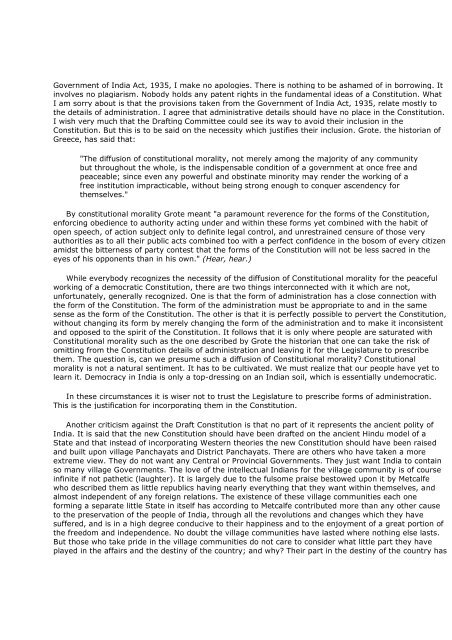
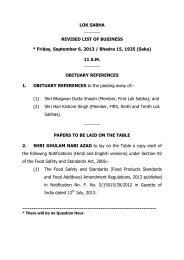
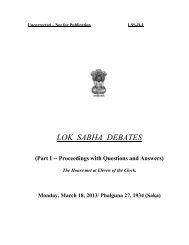
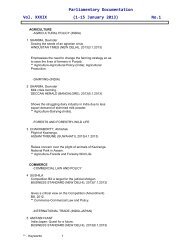
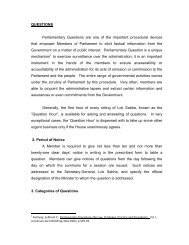
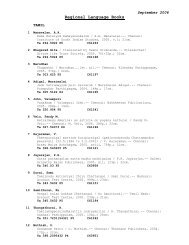
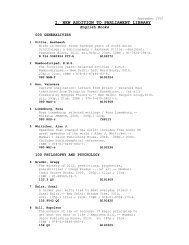
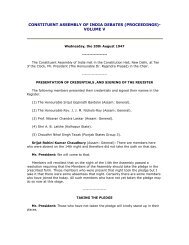
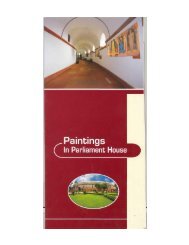
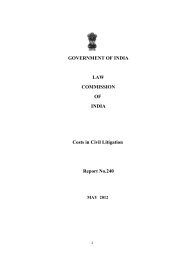
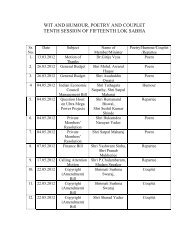
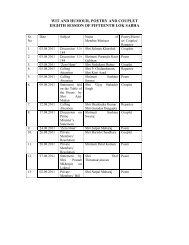

![gÉÉŌ A.]ÉŌ. xÉÉxÉÉ](https://img.yumpu.com/8015720/1/190x245/geeo-aeo-xeexee.jpg?quality=85)
